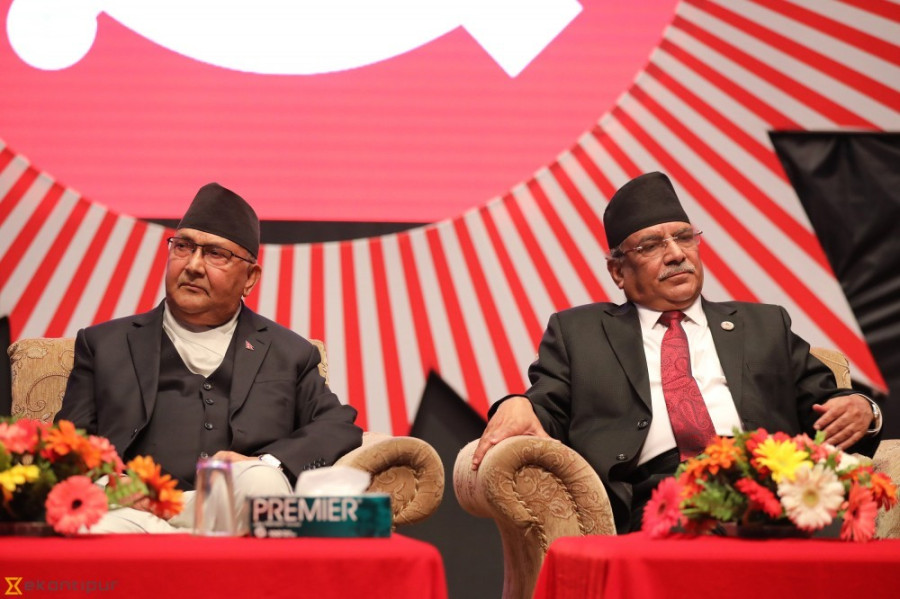Politics
Rift in the ruling party nears tipping point, insiders say
Leaders say the two co-chairmen must resolve all outstanding issues at the earliest
Tika R Pradhan
Prime Minister and Co-chair of the ruling Nepal Communist Party said on Friday that some people’s statements that the party would split were nothing but wishful thinking.
“There is no need to wish, make attempts, suspect and imagine that the party will split,” Oli said at a function organised at the party headquarters in Dhumbarahi to welcome leaders from different groups including the Samajbadi Party Nepal who joined the Nepal Communist Party.
But all is not well within the party, NCP insiders say.
“As far as I know, the conflict between the two top leaders [Oli and Pushpa Kamal Dahal] is just about to reach a tipping point,” said Yubaraj Chaulagain, a central committee member, who represents the former Maoist party.
More than a year after the merger between the erstwhile CPN-UML and the Maoist party, leaders appear vertically divided, and the recent conflict between the top two leaders has stoked concerns that the party could even see a split.
“It could be too early to project a split but things are certainly not looking good as internal powerplay has intensified,” said Chaulagain.
Leaders say party equation is changing so fast that it could reflect on the Parliamentary Party.
The two communist forces had fought the 2017 elections as a left alliance, becoming the first and second largest parties in Parliament. When the two parties announced unification, they together had close to a two-thirds majority in Parliament.
But the factional feud that had been the bane of the then UML continued even after the unification.
According to leaders, Oli is getting increasingly concerned that he might lose his strength in the Parliamentary Party if his rival groups—led by Madhav Kumar Nepal and Jhala Nath Khanal—decide to side with Dahal.
The problem in the party is growing bigger by the day because the two communist forces decided to announce the merger without resolving the outstanding issues, according to Mani Thapa, a standing committee member.
Thapa was one of the leaders who, before the merger, had advocated that the two parties should announce the unification after resolving some major issues, including the party ideology.
But the top leadership decided to prepare a political document which said the party ideology would be “people’s democracy”. The document is yet to be made public despite repeated calls from former Maoist leaders.
Oli, who is under growing pressure—and facing criticism—for some controversial decisions his government has made, seems to be on the defensive of late.
While Oli is scrambling to field questions from his own party members, some former senior leaders are cozying up to Dahal, and this is making him increasingly uncomfortable as it could change the dynamics in the Parliamentary Party.
Even though Dahal has made public statements about a gentleman's agreement he had reached with Oli about leading the government in turn, the latter looks confident that he would be at the helm for a full five-year term.
There’s little likelihood of Oli slipping into minority in the Parliamentary Party, said a leader on condition of anonymity because he feared retribution, but a changed equation can put him on the tenterhooks.
If Dahal and Nepal join hands, according to Bishnu Rijal, a central committee member close to Nepal, their group can have a majority in the party committees.
“Oli knows that unity between Dahal and Nepal could give the ‘new faction’ a comfortable majority in the central committee, standing committee and even the Parliamentary Party,” Rijal told the Post.
During recent meetings with Oli, party’s senior leader Madhav Kumar Nepal had urged him to implement all the agreements, including the one that calls for leading the government in turn.
“I don’t think the issues related to the agreement between the two leaders would be resolved anytime soon,” said Haribol Gajurel, a standing committee member who has close relations with Dahal. “And this could take a toll on the party.”
Many leaders believe that the unification between the two communist forces was just superficial and that they were never organically connected, hence the current problem.
Though talks have been going also on addressing all the issues through a “package deal”, which would mean sorting out party problems and reshuffling the Cabinet, no substantial initiatives have been taken.
“We are in a sensitive situation,” said Bhim Rawal, a standing committee member close to Nepal. “Top leaders must move ahead by implementing all the agreements signed during the unification.




 15.12°C Kathmandu
15.12°C Kathmandu















